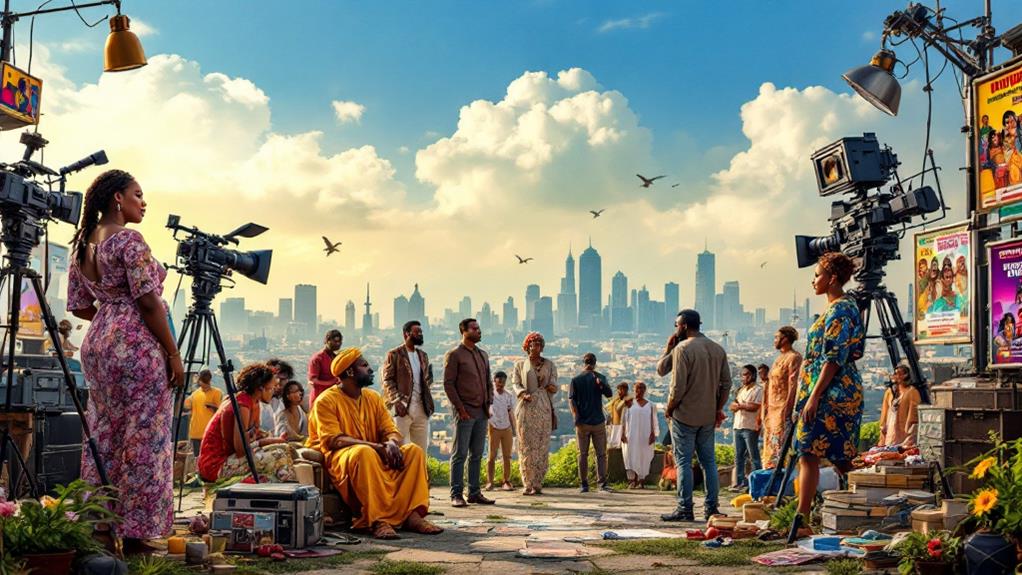The Evolution of Nigerian Entertainment: From Nollywood to Global Recognition

Nollywood's plunge from local phenomenon to global powerhouse has been astonishing. You'll see how it started with the 1992 release of "Living in Bondage," sparking a surge in low-budget, direct-to-video films. The industry's rapid growth was fueled by affordable technology and informal distribution channels. As digital filmmaking took hold, production quality improved, attracting international audiences. Streaming platforms like Netflix now showcase Nigerian content worldwide, while Nollywood films earn accolades at prestigious festivals. This evolution has opened doors for diverse narratives and fresh viewpoints, pushing the boundaries of African storytelling. The industry's metamorphosis continues to unfold, with exciting developments on the horizon.
Origins of Nollywood
Three key factors sparked the birth of Nollywood in the early 1990s. First, the release of "Living in Bondage" in 1992 marked a turning point for the Nigerian film industry. This groundbreaking film set the stage for a pioneering era of storytelling that resonated with local audiences.
Second, the adoption of low-budget, direct-to-video films allowed filmmakers to produce content quickly and efficiently. These productions, with their modest budgets and rapid shooting schedules, met the high demand for local entertainment. The transition from traditional Nigerian storytelling methods to the video film format enabled a new generation of filmmakers to investigate social and political themes that struck a chord with viewers.
Finally, the increasing affordability and accessibility of video cameras and editing equipment democratized the filmmaking process. This technological shift empowered aspiring directors and producers to create content without the need for expensive studio backing.
As a result of these factors, you'll find that Nollywood experienced rapid growth throughout the 1990s and early 2000s. The industry's ability to produce culturally relevant content while adapting to new technologies laid the foundation for its future success and global recognition.
Rise of Home Video Productions
The rise of home video productions in Nigeria revolutionized the country's film industry in the 1990s. You'd witness a surge in low-budget, direct-to-video movies as affordable video cameras and editing equipment became readily available. These home videos, often shot quickly and cheaply, found their way into the hands of Nigerian audiences through informal channels like street vendors and video rental shops.
This transformed era empowered a fresh generation of Nigerian filmmakers to bypass traditional industry gatekeepers and cater directly to local tastes. You'd see these home videos addressing everyday social issues and reflecting Nigeria's rich cultural and linguistic diversity, resonating with viewers both at home and in the diaspora.
The success of films like "Living in Bondage" in 1992 laid the groundwork for what would become Nollywood. You'd notice how these productions tapped into the preferences of Nigerian audiences, creating a thriving industry that would soon gain international recognition. The home video phenomenon not only democratized filmmaking in Nigeria but also set the stage for the country's entertainment industry to evolve and capture global attention in the years to come.
Digital Revolution in Filmmaking

A digital revolution swept through Nigeria's film industry in the early 2000s, altering Nollywood's production methods and distribution channels. You'll notice a significant shift from analog to digital cameras, enabling filmmakers to produce higher-quality content at lower costs. This technological leap has led to improved production quality, attracting both local and international audiences.
The rise of streaming platforms like Netflix and Amazon Prime has given Nigerian filmmakers unparalleled global recognition. You'll find a new wave of Nollywood films, often referred to as "New Nollywood," showcasing enhanced storytelling techniques and production values. These feature films are competing on the world stage, breaking boundaries and challenging stereotypes.
As you investigate this digital revolution, you'll experience:
- The thrill of seeing Nigerian stories reach millions worldwide
- The self-assurance of watching homegrown talent shine on international platforms
- The excitement of witnessing Nollywood's transformation into a global powerhouse
You're witnessing a crucial moment in Nigerian entertainment history. The digital revolution has not only improved technical aspects but also opened doors for diverse narratives and fresh perspectives. As Nollywood continues to evolve, you can expect even more innovative and captivating content in the years to come.
International Recognition and Streaming
Nigerian entertainment has plunged onto the global stage, capturing international attention and acclaim. You'll notice Nollywood films gaining unprecedented international recognition, with streaming platforms like Netflix and Prime Video showcasing Nigerian content to global audiences. This exposure has significantly widened the industry's reach, allowing you to enjoy these films from anywhere in the world.
As you probe Nigerian cinema, you'll see a marked improvement in production values, attracting international audiences and critical acclaim. Nigerian filmmakers are now regular fixtures at prestigious Film Festivals, earning accolades and further boosting the industry's reputation. You'll find that streaming services have played a crucial role in this transformation, investing in original Nigerian content and providing a platform for both established and emerging talent.
This surge in international recognition has encouraged Nigerian filmmakers to push creative boundaries, resulting in more diverse and high-quality productions. You'll discover a rich tapestry of stories that blend traditional Nigerian narratives with universal themes, appealing to viewers across cultures. As you delve into this evolving landscape, you'll witness Nigerian entertainment's journey from local phenomenon to global cultural force.
Nollywood at Film Festivals

Prestigious film festivals worldwide have become a significant platform for Nollywood's rise to international prominence. You'll find Nigerian cinema gracing the screens at renowned events like Cannes, Toronto International Film Festival, and Berlin International Film Festival. These showcases not only provide Nollywood filmmakers with international acclaim but also offer opportunities to engage in pivotal dialogues about the industry's growth and challenges.
The success of Nollywood at film festivals is evident in the awards and recognition received. For instance, "October 1" clinched the Best Film award at the 2014 Toronto International Film Festival, highlighting the quality of Nigerian productions on the global stage.
Nollywood's presence at these events has led to:
- Increased visibility and appreciation of African stories
- New collaborations and co-production opportunities
- A platform for showcasing Nigeria's rich cultural heritage to audiences worldwide
The Essence Film Festival has emerged as a particularly important event for Nollywood, cultivating connections with the global film and TV community. As you witness Nollywood's growing influence at international film festivals, you're seeing the industry's potential to reshape perceptions of African cinema on the world stage.
Pushing Boundaries in Storytelling
While international film festivals have propelled Nollywood onto the global stage, it's the industry's bold approach to storytelling that's truly capturing worldwide attention. You'll find Nigerian filmmakers pushing boundaries and embracing diverse narratives that resonate with audiences far beyond their borders.
Editi Effiong's "The Black Book" exemplifies this trend, reaching #3 on Netflix's global film charts and amassing over 20 million views worldwide. This success demonstrates Nollywood's ability to create compelling stories that transcend cultural boundaries.
The industry's evolution is further evident in its embrace of higher production values and international collaborations. Moses Babatope's Nile Media Entertainment Group, led by an all-female executive team, is driving significant development and investment in Nollywood.
As you investigate Nigerian cinema, you'll uncover a rich tapestry of authentic African culture and stories. Nollywood's talent and ambition continue to fuel experimentation with new genres and storytelling techniques. Through platforms like the Essence Film Festival, the industry engages in pivotal dialogues about its future, bridging cultures through the power of storytelling and solidifying its place on the global entertainment stage.
Future Prospects and Challenges

Despite its exceptional growth, Nollywood faces both exciting prospects and significant challenges in the years ahead. As Nigeria's film industry continues to gain global recognition, you'll see an increasing number of Nigerian films on international streaming platforms. This exposure to a wider audience presents an opportunity for filmmakers to showcase Nigerian culture and stories on a global stage.
However, with this increased visibility comes the need for higher production values and more sophisticated storytelling techniques. You'll find that Nollywood must adapt to meet the expectations of an international audience while maintaining its unique identity.
The industry also faces significant challenges, including:
- Rampant piracy that threatens filmmakers' livelihoods
- Limited funding opportunities for ambitious projects
- The need to balance local content with global appeal
Despite these obstacles, Nollywood's future prospects remain bright. As you watch the industry evolve, you'll witness Nigerian filmmakers pushing boundaries, exploring new genres, and collaborating with international partners. The industry's resilience and creativity will continue to drive its growth, ensuring that Nigerian entertainment remains a powerful force in the global cultural milieu for years to come.


